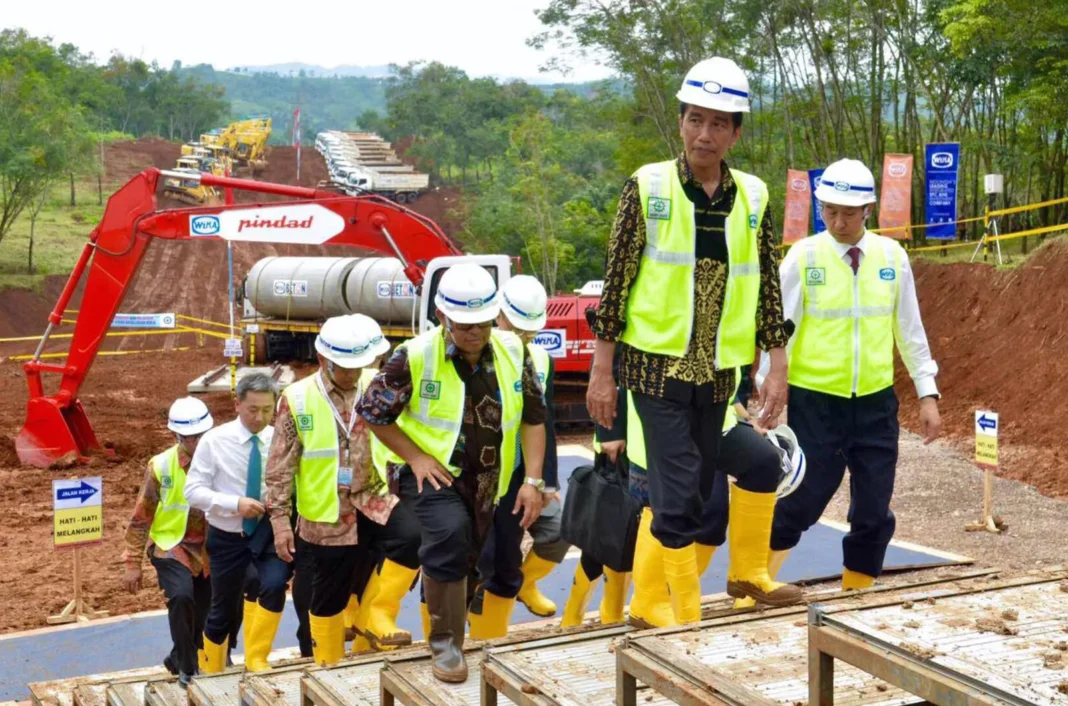JAKARTA – For the frustrated Indonesian government, the light at the end of the tunnel still looks as far away as ever as it struggles to overcome cost overruns, land acquisition and technical problems holding up what was meant to be China’s signature Jakarta-Bandung fast-rail project.
Now three years behind the original completion date, the cost of the Belt and Road Initiative (BRI) joint venture between a Chinese consortium and four Indonesian state-owned enterprises has ballooned from US$6.07 billion to nearly $8 billion.
Clearly aware of the harm it is doing to China’s global infrastructure development strategy, President Xi Jinping sought to inject new urgency into the long-delayed project during his recent meeting with Indonesian President Joko Widodo in Beijing.
The Chinese media weighed in as well. “The Belt and Road cooperation is marching to a higher quality and sustainable development,” the pro-Beijing Global Times said in its report on the summit.
A joint statement issued by the two leaders said they were committed to the completion of the new railway “on schedule as a flagship project” and to work on what it called “more strategic projects” such as the Regional Comprehensive Economic Corridor.
Under that BRI venture, Indonesia has proposed building seaports, industrial estates, power plants, smelters and tourism estates spread across North Sumatra, North Kalimantan, North Sulawesi and Bali worth more than $90 billion.
Three of the four provinces sit on the northern periphery of the archipelago, with North Sumatra bordering the strategic Malacca Strait and North Kalimantan chosen as the site of a 9,000-megawatt hydro-electric plant to power Chinese-funded aluminum smelters.
Meanwhile, the ballooning cost of the fast-rail enterprise has forced the government to dip into the state budget – something it promised not to do – to help make up the difference.
Infrastructure and financial experts are still questioning how a short, 143-kilometer rail link will turn a profit without substantial commercial development growing up around it, the key to many urban transportation projects.
Public policy commentator Agus Pambagio, who conveyed his misgivings directly to President Widodo in 2016, told news portal Katadata: “It is not feasible. It should never have been built because it is not necessary. It will take decades to recover the cost.”
Although it will cut travel time from three hours to 40 minutes, many potential passengers are likely to use the existing expressway, completed in 2005, rather than fight traffic congestion over considerable distances just to reach the stations at each end.
PT Kereta Api Indonesia China (KCIC), the joint venture building the railway, has said it is not expected to become profitable for more than 40 years, twice the assumption of a return on investment laid out in the original feasibility study.
A recent study by the University of Indonesia’s Center for Engineering Services has calculated demand at 31,215 passenger trips a day, about half of the company’s initial estimate of 61,157 trips made five years ago.
Ticket prices are also an issue. Officials have estimated the cheapest ticket could be in the range of 300,000 rupiah ($20), a major increase over the 90,000 rupiah it costs to ride the regular train.
Anxious to build on his legacy as the infrastructure president, Widodo ignored Pambagio’s advice, insisting that Indonesia needed a cutting-edge mode of transport. Most experts believe that should have been reserved for the longer 800-kilometer link between Jakarta and the East Java port city of Surabaya.
Only last week, the government announced it was starting work on upgrading the existing Jakarta-Surabaya line to semi-high-speed with the help of Japan, which was initially chosen to build the Jakarta-Bandung link before the new Widodo administration decided the Chinese could build it faster.
The railway is now scheduled to be operational in June next year, leaving the government to ponder how it can be ceremoniously “opened” by President Xi when he attends the G20 summit in Bali in November.
Wahyu Utomo, a senior official at the economic affairs coordinating ministry, says the Chinese pressed the Indonesian delegation to act quickly on meeting the cost overrun of $1.9 billion, a move that has yet to receive Finance Ministry approval.
The government had initially called on the China Development Bank (CDB) to fund 75% of the discrepancy, using the same financing structure that applied to the original cost of the project.
Finance Minister Sri Mulyani Indrawati told Parliament last November that the government had agreed to inject an additional $299 million into the venture, which falls far short of what is required to complete the final 18% of construction.
The four Indonesian enterprises control 60% of the KCIC consortium and the remaining 40% is in the hands of the China Railway International Co Ltd Engineering Corp and four other Chinese companies.
Since construction began in 2016, the project has been plagued by setbacks, beginning with difficulties in acquiring land, particularly around Jakarta’s outer suburb of Karawang where real estate prices have risen sharply over the past decade.
KCIC has also pointed to the forced relocation of electricity substations, water mains and fiber-optic cables and other public utility grids that were unforeseen during the planning stage. One of three stations planned along the route has been dropped because of escalating costs.
There have also been technical challenges. Early this year, KCIC disclosed the existence of serious subsidence problems in one of the 13 tunnels caused by unstable clay shale, similar to that which also delayed the construction of the nearby expressway.
Critics say that should have been anticipated when an authorized study conducted by the KCIC in 2016 identified at least four points along the rail line that were considered vulnerable to landslides and other geological problems.

